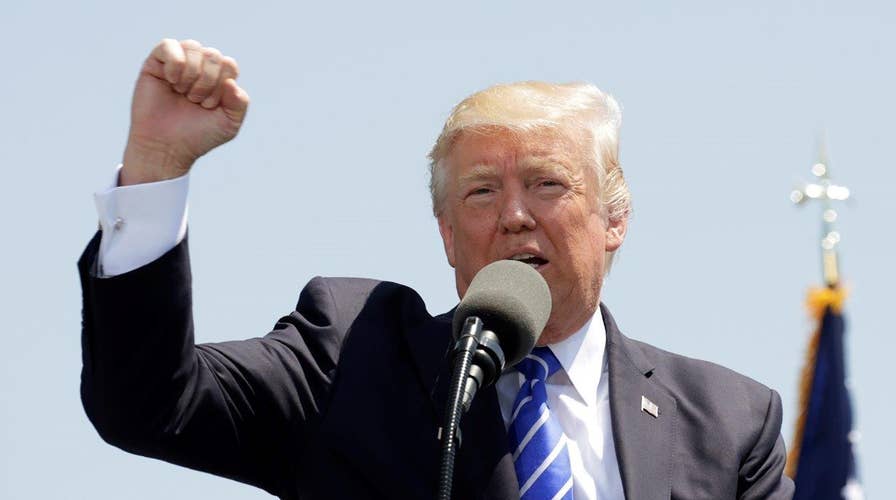New concerns Trump's tax reform initiative could be delayed
House Speaker Ryan is rejecting any suggestion it could slip to next year; Mike Emanuel explains on 'Special Report'
The establishment press is easily distracted. Their goal is to sell papers or TV advertising. Conspiracy theories about Russians are more fun for the talking heads than deep dives into tax reform and health care reform.
By Election Day 2018 the American people will want to know the answer to the question, "are you better off than you were two years ago?"
Do you have a job?
Do your family members have opportunities and increasing wages?
Or not.
The success of the Trump presidency will hinge on the passage of pro-growth tax reform that addresses the American competitiveness problem, boosts the economy, creates more jobs, and leads to higher wages.
For the economy to grow, tax reform must be permanent, it must lead to competitive tax rates with territoriality, and it must allow immediate expensing of business assets.
It has been more than 30 years since the tax code was reformed, and in that time, the world has changed drastically. Other countries have updated their tax codes and lowered their rates, while the U.S. system has barely changed.
Over the past decade, the economy has struggled at just two percent GDP growth – the worst recovery of the modern era. This lackluster recovery has cost families an average of $8,600 in annual income, according to the Joint Economic Committee. The Congressional Budget Office projects that two percent growth will continue into the next decade under current policies.
Today, American businesses are taxed at rates far exceeding the rates faced by foreign competitors. The average federal/state corporate tax rate in the U.S. is roughly 39 percent, while the average rate paid by foreign competitors is about 25 percent. Businesses organized as pass-through entities face even higher rates – above 40 percent, and even 50 percent when state tax rates are accounted for.
While the U.S. rate remains high, other countries have adapted to the global changes by aggressively reducing their rates. Today, only the U.S. and Chile have higher corporate tax rates than they did at the start of the century.
People, not businesses, pay taxes, so high business rates are directly absorbed by employees, consumers, and investors through lower wages, fewer jobs, and stagnant economic growth.
As much as 70 percent of the corporate tax cost is borne by labor, according to the CBO. Every dollar increase in the corporate rate decreases wages by two dollars.
As much as 70 percent of the corporate tax cost is borne by labor, according to the CBO. Every dollar increase in the corporate rate decreases wages by two dollars.
In addition to lower rates, the code must be updated so it is globally competitive.
Today, the U.S. is only one of six developed countries with a worldwide system of taxation. Because of this system, American businesses operating overseas are double taxed on income – once when they earn it in the country they are operating in, and again when they bring this money back into the U.S. economy.
American businesses are faced with a disadvantage relative to their foreign competitors, and this system has also resulted in an estimated $2.6 trillion in after-tax income being stranded overseas, unable to be reinvested in the U.S. economy. Moving to territoriality will fix this competitiveness problem and allow businesses to compete.
Tax reform should also move toward a cash-flow system where business investments can be immediately deducted.
Under the current code, business owners cannot immediately expense the cost of purchasing equipment against their taxable income. Instead, they are required to deduct, or “depreciate,” these costs over several years depending on the asset they purchase, as dictated by complex and arbitrary IRS tables. These rules create needless complexity and increase compliance costs.
Moving to a cash-flow system where businesses can immediately recover the cost of their purchases also leads to strong economic growth. According to the Tax Foundation, full business expensing increases GDP by five percent after a decade and increases wages by four percent.
A tax plan that includes competitive rates, territoriality, and expensing will allow Trump to meet his promise of strong economic growth. These changes must be made permanent so taxpayers have the certainty to make decisions that drive economic growth.
The U.S. tax code of 2017 is outdated, uncompetitive, and complex. It restricts the growth of new jobs, increases the cost of capital, and discourages innovation. Reforming this code with pro-growth policies must be the top priority for lawmakers this year.









































